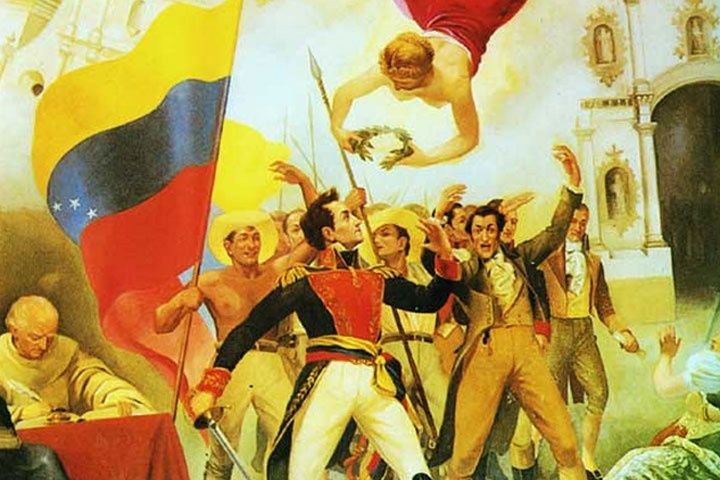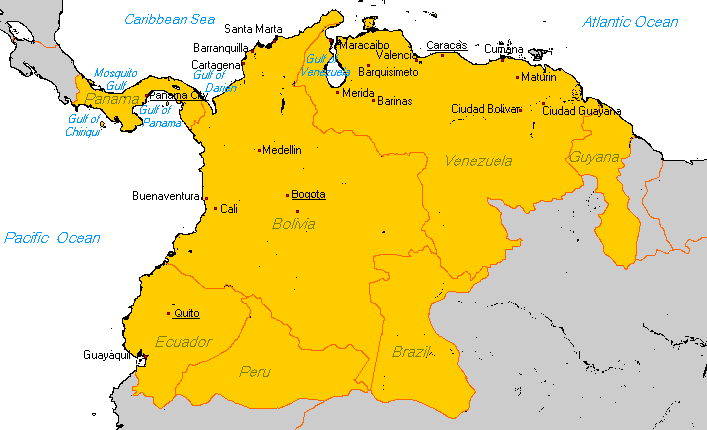ABOUT THE AUTHOR

IMPULSE TRAVEL TEAM
We are a team of storytellers here to bring you the best Colombia has to offer. On our blog, we answer your most frequent questions and uncover our countries mysteries, culture, and highlights for you.
A Simon Bolivar statue here, a place named after him there or even the land of Bolivia bears the last name of this legendary personality. A name that can often be found in the northern part of the South American continent and probably makes one or the other traveler wondering about it. But who is this person to whom so many symbols are dedicated to? It's a personality that has made a significant contribution to shaping this part of the world as it is today.
Señor Bolívar is considered as the most important freedom fighter against the Spanish colonial power of South America and a creator of significant intellectual property. He played a leading role in the history of independence for the countries of Bolivia, Ecuador, Colombia, Panamá, Peru and Venezuela, a fact that brought him the status of a hero. He harbored the dream of a united, liberal and free South America, but one step at a time.

Simón Bolívar - El Libertador
The Early Life
The son of a wealthy, from Spain emigrated family saw the light of day in 1783 in Caracas, the capital of today's Venezuela.
Even when his parents died at his tender age of 9, he never had to live in poverty and enjoyed a high quality education, including a huge part of it in Spain, the first of his big journeys over the rough Atlantic Ocean.
Not a long time after the return to his homeland, where his then newly married wife died shortly after arrival, he went on a journey through Europe where he was on the verge of political maturation.

Simón Bolívars life time travels
Inspired by Napoleon’s French revolution and driven by the liberal spirit of Rousseau he returned 1811 strengthened to Caracas with the aim of freeing Venezuela from the clutches of the Spanish conquerors including the formation of a Congress.
The first attempt at liberation failed enormously as he had to flee to Cartagena afterwards where he wrote his Manifesto of Cartagena, the beginning of his successful liberating activities.
Accomplishments
From Cartagena he planned and thus successfully led the invasion of Venezuela, which brought him the name of “El Libertador”. Even a successful capture of Bogota was not denied to him, but he failed at Cartagena, after which he fled to Jamaica to gather his strength for the forthcoming.
In 1819 he came back with the conquest of Boyaca, whereby New Granada (today's Colombia) was also liberated from the Spaniards. He then founded Gran Colombia, a republic composed with provinces of Venezuela, Colombia and Ecuador and immediately took the lead over this newly formed empire.
The republic expanded more and more, with battles in the area of Peru whereby further namely parts joined Gran Colombia and 1825 Alto Peru was renamed in Bolivia, presumably the Zenit Bolivars machinations.

Gran Colombia during its largest expansion
Meanwhile the parties within the government of Greater Colombia were fighting each other, culminating in an assassination attempt against Simon Bolívar. He survived unharmed, but his position was weakened. Two years later he resigned from politics and died after a few months in Santa Marta.
Followed by his death, the Republic broke up into its individual states.
Ideology and the Dream of a united Spanish South America
What Bolívar intended was to unify all of South America into a federal republic. While he thus gave full scope to his dreams of attaching half a world to his ideology, real power quickly slipped out of his hands which led to the disintegration of his created Empire.
A reason for his downfall could have been a too liberal attitude. His ideology, driven and inspired by the spirits of both the French and American revolutions, was probably not ready yet for South America which was long dominated by Spain.

Famous quote of Simón Bolívar which shows his liberal mindset
This is also reflected in his handling of enslavement: from the very beginning, Bolivar was committed to the liberation of them. According to his ideology, characterized by liberalism, it is impossible for free people to rule over serfs in a free country, this is already contradictory in principle. Presumably he was a nose length ahead of local events, influenced by his European education, a culture that has already undergone this development.
In the end Bolivar's death was initially considered as a liberation by many South Americans, hero worship began in the 1840s and continues until today.

Simón Bolívar
Señor Bolívar is considered as the most important freedom fighter against the Spanish colonial power of South America and a creator of significant intellectual property. He played a leading role in the history of independence for the countries of Bolivia, Ecuador, Colombia, Panamá, Peru and Venezuela, a fact that brought him the status of a hero. He harbored the dream of a united, liberal and free South America, but one step at a time.
Simón Bolívar - El Libertador
The Early Life
The son of a wealthy, from Spain emigrated family saw the light of day in 1783 in Caracas, the capital of today's Venezuela.
Even when his parents died at his tender age of 9, he never had to live in poverty and enjoyed a high quality education, including a huge part of it in Spain, the first of his big journeys over the rough Atlantic Ocean.
Not a long time after the return to his homeland, where his then newly married wife died shortly after arrival, he went on a journey through Europe where he was on the verge of political maturation.
Simón Bolívars life time travels
Inspired by Napoleon’s French revolution and driven by the liberal spirit of Rousseau he returned 1811 strengthened to Caracas with the aim of freeing Venezuela from the clutches of the Spanish conquerors including the formation of a Congress.
The first attempt at liberation failed enormously as he had to flee to Cartagena afterwards where he wrote his Manifesto of Cartagena, the beginning of his successful liberating activities.
Accomplishments
From Cartagena he planned and thus successfully led the invasion of Venezuela, which brought him the name of “El Libertador”. Even a successful capture of Bogota was not denied to him, but he failed at Cartagena, after which he fled to Jamaica to gather his strength for the forthcoming.
In 1819 he came back with the conquest of Boyaca, whereby New Granada (today's Colombia) was also liberated from the Spaniards. He then founded Gran Colombia, a republic composed with provinces of Venezuela, Colombia and Ecuador and immediately took the lead over this newly formed empire.
The republic expanded more and more, with battles in the area of Peru whereby further namely parts joined Gran Colombia and 1825 Alto Peru was renamed in Bolivia, presumably the Zenit Bolivars machinations.
Gran Colombia during its largest expansion
Meanwhile the parties within the government of Greater Colombia were fighting each other, culminating in an assassination attempt against Simon Bolívar. He survived unharmed, but his position was weakened. Two years later he resigned from politics and died after a few months in Santa Marta.
Followed by his death, the Republic broke up into its individual states.
Ideology and the Dream of a united Spanish South America
What Bolívar intended was to unify all of South America into a federal republic. While he thus gave full scope to his dreams of attaching half a world to his ideology, real power quickly slipped out of his hands which led to the disintegration of his created Empire.
A reason for his downfall could have been a too liberal attitude. His ideology, driven and inspired by the spirits of both the French and American revolutions, was probably not ready yet for South America which was long dominated by Spain.
Famous quote of Simón Bolívar which shows his liberal mindset
This is also reflected in his handling of enslavement: from the very beginning, Bolivar was committed to the liberation of them. According to his ideology, characterized by liberalism, it is impossible for free people to rule over serfs in a free country, this is already contradictory in principle. Presumably he was a nose length ahead of local events, influenced by his European education, a culture that has already undergone this development.
In the end Bolivar's death was initially considered as a liberation by many South Americans, hero worship began in the 1840s and continues until today.
Simón Bolívar







